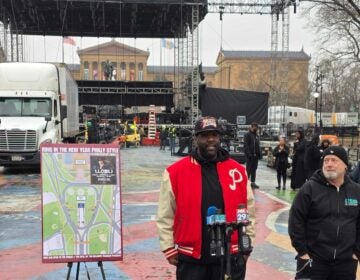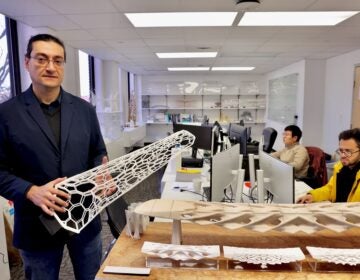Seven questions for City Commissioner Al Schmidt about his voting-irregularities report
NewsWorks sat down with Al Schmidt, the Republican City Commissioner and East Falls resident, last week to discuss his controversial “Voting Irregularities in Philadelphia County, 2012 Primary Election” report (PDF).
At the Trolley Car Café just off of Kelly Drive, Schmidt described a process which, starting shortly after he was sworn in, expressly did not seek to find citywide figures of voter-fraud occurrences. Rather, he said, the aim was to find ways in which voter fraud could be committed.
Here is a Q&A from that Friday afternoon interview:
NewsWorks: It seems as if your report is being used by both sides of a divisive issue to validate their beliefs, and that has resulted in criticisms being leveled at you and your motives. Why do you think that is?
Al Schmidt: It’s a highly charged political debate right now. Some want to see the report as proof that there are hundreds of thousands of cases out there; others are saying it’s proof that there are no fraudulent votes. But, everybody wants to answer the question: How much of this is there? The report says, at the very beginning, that it was not our intention to find that number. The report, by design, was largely anecdotal. We were looking at examples of how voter fraud occurs and came up with a list of seven.
NW: You and [current Commission Chairwoman] Stephanie Singer both ran for this office with a message of bringing transparency to the election process in Philadelphia. Yet, she has been rather critical of you and the report. How come?
AS: She’s questioned my integrity, and called the press conference I held to release the report a “stunt.”
Months ago, there was a common interest in finding out if voter fraud was occurring. At the press conference, I was asked ‘Why didn’t Singer sign off on it?’ I didn’t call it a stunt when she held a press conference about the hurdles voters born in Puerto Rico face with the voter ID law, and I’m sure nobody asked her if I’d signed off on her press conference.
It’s a highly political time. Before we released this, let me draw a comparison, I knew it was like having broken a leg and when they go to re-set it, you know it’s going to hurt, but it still hurts when they do it. They have to re-set it, though. Well, I knew there was going to be controversy.
The response to the report has not surprised me. The misunderstanding of what the report actually says has.
NW: Do you think the reaction would have been different if you waited until after Election Day to release the report?
AS: Absolutely. Everybody would have returned to their senses at that point. It probably wouldn’t get this level of attention.
But then, what if I knew that there were 10 instances of voter fraud, and an election – any one of them, lower-ballot races are more likely affected in this way than a Presidential or U.S. Senate race – was decided by fewer votes. Could you imagine the [backlash]? Why didn’t you tell anybody? It would be professionally unconscionable if I didn’t release the findings as soon as I had them.
NW: (Submitted via Twitter by reader Elliott Griffin (@elleimani) How will the problems outlined in [the] report actually be addressed by the new voter ID law?
AS: The voter ID law affects the voter-impersonation findings most directly. It’s a matter of identity theft. We don’t have a list of non-registered [Philadelphians] in our database.
NW: What is your stance on the voter ID law?
AS: Our job is to implement the election law, whether it holds that a voter has to show proof that they are who they say they are, or if it holds that anybody can vote regardless. I wasn’t elected into this office to have opinions on the laws themselves.
NW: Do you think this report will have an impact on future elections?
AS: That’s certainly the hope, to bring about change, to deter [fraud] from happening.
NW: What would it take for Philadelphia to have a “clean” election?
AS: Working with [the U.S. Citizenship and Immigration Services] would help us solve instances of voting by non-U.S. citizens. There are already plenty of laws on the books addressing voter fraud. You don’t need a new law to say you can’t vote twice. There are few prosecutions because it’s very, very difficult to prove, and nobody looked before. You don’t know how often it goes on if you don’t look.
WHYY is your source for fact-based, in-depth journalism and information. As a nonprofit organization, we rely on financial support from readers like you. Please give today.




